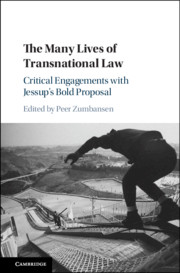Book contents
- Reviews
- The Many Lives of Transnational Law
- The Many Lives of Transnational Law
- Copyright page
- Contents
- Contributors
- Preface and Acknowledgements
- Introduction Transnational Law, with and beyond Jessup
- Part I Transnational Law
- Part II Transnational Law as Regulatory Governance
- 4 Aiding and Abetting in Theorizing the Increasing Softification of the International Normative Order: A Darker Legacy of Jessup’s Transnational Law?
- 5 From International Law to Jessup’s Transnational Law, from Transnational Law to Transnational Legal Orders
- 6 Transnational Law in the Pacific Century
- 7 Transnational Law in Context
- 8 Transnational Law and Adjudication: Domestic, International and Foreign Intersections
- 9 Transnational Law and Global Dispute Resolution
- 10 Conflicts of Law and the Challenge of Transnational Data Flows
- 11 What Lex Sportiva Tells You about Transnational Law
- 12 Family Law
- Part III Transnational Law
- Part IV Conclusion
- Index of Names
- Subject Index
7 - Transnational Law in Context
The Relevance of Jessup’s Analysis for the Study of ‘International’ Arbitration
from Part II - Transnational Law as Regulatory Governance
Published online by Cambridge University Press: 18 March 2020
- Reviews
- The Many Lives of Transnational Law
- The Many Lives of Transnational Law
- Copyright page
- Contents
- Contributors
- Preface and Acknowledgements
- Introduction Transnational Law, with and beyond Jessup
- Part I Transnational Law
- Part II Transnational Law as Regulatory Governance
- 4 Aiding and Abetting in Theorizing the Increasing Softification of the International Normative Order: A Darker Legacy of Jessup’s Transnational Law?
- 5 From International Law to Jessup’s Transnational Law, from Transnational Law to Transnational Legal Orders
- 6 Transnational Law in the Pacific Century
- 7 Transnational Law in Context
- 8 Transnational Law and Adjudication: Domestic, International and Foreign Intersections
- 9 Transnational Law and Global Dispute Resolution
- 10 Conflicts of Law and the Challenge of Transnational Data Flows
- 11 What Lex Sportiva Tells You about Transnational Law
- 12 Family Law
- Part III Transnational Law
- Part IV Conclusion
- Index of Names
- Subject Index
Summary
The chapter considers, on the one hand, the ways in which international arbitration was a source of inspiration for Philip Jessup when he elaborated the notion of transnational law. On the other hand, it considers how the notion of transnational law constitutes a relevant tool for the analysis of international arbitration. The chapter relies in particular on the documents gathered in the Philip C. Jessup Collection at the Library of Congress, which include early drafts and preparatory works for the Storrs Lectures at Yale University. It examines three discrete stories that each illustrate one salient aspect of the notion of transnational law (norms, actors and processes) and its relevance for the analysis of international arbitration.
Keywords
- Type
- Chapter
- Information
- The Many Lives of Transnational LawCritical Engagements with Jessup's Bold Proposal, pp. 186 - 196Publisher: Cambridge University PressPrint publication year: 2020

